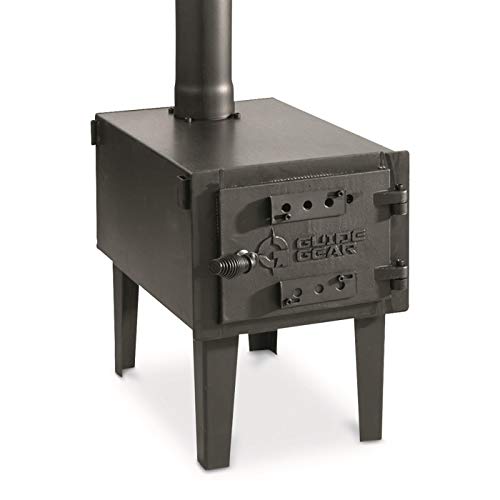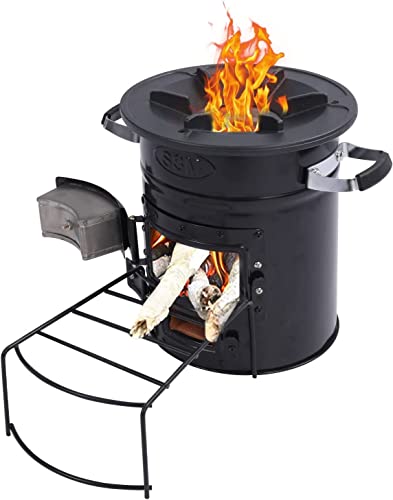9 . What Your Parents Taught You About Outdoor Wood Burning Stove
페이지 정보

본문
 The Craftsmanship of an Outdoor Wood Burning Stove
The Craftsmanship of an Outdoor Wood Burning Stove Craftsmanship is an essential factor in the durability and performance outdoor equipment. With this in mind, this stove exudes robustness and resilience.
Craftsmanship is an essential factor in the durability and performance outdoor equipment. With this in mind, this stove exudes robustness and resilience.It can be used to cook and heat water, and its design minimizes the production of smoke. This makes it a great option for camping trips.
It is recommended to place the stove at a safe distance away from combustible materials.
Versatility
A wood burning stove is a great addition to any home and can be used as a main source of heat, or in conjunction with other heating systems. It can be used outdoors to extend the outdoor season, and create the perfect setting to spend time with your family and friends.
Installing an outdoor wood stove is easy. It is made of sturdy materials that can withstand the harsh conditions outdoors and is designed for security. Its chimney should be properly sealed and ventilated to stop smoke from entering the home or posing a fire hazard to nearby trees and bushes. An outdoor wood stove fireplace is a better alternative to traditional indoor models, which release harmful levels of indoor air pollution and can pose a fire risk.
The Guide Gear wood-burning stove is a versatile choice that offers numerous benefits. The stove can be used to burn wood, solidified ethanol tablets, or hexamine fuel block. It is also able to boil water in less than six minutes making it an ideal option for outdoor cooking. In addition it is light and compact, which makes it a great option for backpackers looking to save space and weight in their camping equipment.
A wood stove in the outdoors can also be used as back boiler to heat water. This could lower your energy costs and have a positive impact on the environment. This is especially beneficial in areas where access to coal, oil or gas is not available. It is important to keep in mind that outdoor wood stoves do not perform the same way as modern heating equipment. They also require regular maintenance.
Portability
An outdoor wood burning stove is a great option to keep your tent warm while camping in the great outdoors. It's light and portable wood burning stoves, making it easy to take it along on your adventures. It's also simple to operate and maintain. The only downside is that it requires a lot of effort to prepare the fuel. This involves cutting, stacking and loading. Additionally, it must be seasoned prior to use. However, this is a great and enjoyable family task that can be completed while camping.
This defra stove is not only robust, but also beautiful. Its sleek design and compact frame create an impressive balance of functionality and visual appeal and make it a perfect companion for outdoor enthusiasts. In addition the woodburner stove is capable of cooking meals and heating tents and other shelters for outdoor use.
The Zorestar stove is a great choice for those who appreciate the versatility of pellets or wood. It can be used to heat a tent, tiny house or van, and provide a consistent source of warmth for days or weeks. The stove has a huge cooking area that can hold pans or pots that are up to 8 inches wide.
A wood-burning outdoor stove also produces less smoke than a wood burner or fireplace, which can improve the indoor air quality as well as reduce the amount of firewood you have to purchase and cut. Find the stove that is EPA certified and uses advanced combustion techniques to reduce emissions. The stoves that are EPA-certified will also save you money on fuel and could reduce the frequency at which your neighbors complain about your wood smokestack.
It's important to remember that an OWB emits a significant amount pollutants. This is particularly true if you burn wood that is not well-seasoned or other inappropriate materials. NESCAUM mentions that enforcement programs have found OWBs burning tires, trash bags and railroad tie, among others. Choose an EPA-certified stove with strict emission standards to avoid this.
Efficiency
An outdoor wood burning stove is a great option to heat your home. They provide warm, pure heat that is more cost effective than propane or natural gas alternatives. The efficiency of outdoor woods stoves varies based on the type and seasoning of the wood. In general, stoves that are more efficient emit less smoke and have more BTU per hour of output.
A basic outdoor wood burning stove consists of a fire pit with a blower, doors and a fire pit. The doors let you access the firebox to clean and maintain it, while the blower circulates hot air. The doors will ensure that the air isn't being blown back out of the firebox and into your living room.
The efficiency of an outdoor wood heater can be affected by factors such as the quality of the wood used, how it is dried, as well as the operation of the appliance. Making sure to select kiln dried firewood with a moisture content of less than 20% is essential to achieving maximum efficiency. Avoid using painted or oiled firewood because they can cause odours and pollution. They also contribute to chimney deposits.
The amount of heat produced by the stove when it is in operation can also impact its efficiency. The more efficient models use pre-heated air to boost combustion and to maximize heat. Others use baffles or other mechanisms that force hot gases to travel longer distances, allowing for more dwell time before they fully burn.
While tests for emissions in the laboratory are a great way to determine the overall quality of an item but they don't accurately represent how the product will perform in real life. In fact the EPA has removed the efficiency ratings for default stoves on their list of stoves that are certified in 2015 due to them being in error and misleading.
The average efficiency of a wood burner for outdoor use is 65 percent while catalytic stoves have an efficiency that is slightly higher (72%). It is vital to keep in mind that the actual efficiency of a fireplace can differ depending on the kind of wood used and the way it is maintained. Green wood, for example has a moisture content that can be up to 50% higher than other types of wood, and therefore requires more energy to heat the water before transferring heat to your home.
Maintenance
While an outdoor wood burning stove is a wonderful option for a cost-effective alternative to electric heating, it is not without maintenance requirements. However, with proper care an OWB can be enjoyed every year. The idea of having a Regency Professional perform an annual cleaning of your stove is the best method to ensure it is in top working condition and ensure you're in compliance with the local building codes.
The frequency at the frequency at which a stove that burns wood should be cleaned is contingent on the frequency at which it is used and the type of wood burning stove sale used and the heat at which the fires are. For example, a stove that is used to heat the house every day must be cleaned at least once a week, and more often during winter months. In addition to scooping out the ash regularly, it's important to check the flue for creosote buildup and glare. If the chimney is not cleaned regularly, creosote will build up and clog the chimney.
Burn only wood that has been allowed a minimum of one year to dry. This will help to reduce the accumulation of creosote. Additionally, only use clean, dry tinder (like paper or kindling) to start the fire. This will help prevent smoldering which can cause more creosote.
Another important task for maintenance is ensuring that the glass on the fireplace's door remains clean. To get rid of stubborn creosote that has been glazed take a damp cloth and gently scrub the surface of the glass. Then using a piece of kitchen paper to clean off the excess water the glass will sparkle.
Check the air intake vent on the wood stove and its chimney cap. If they are blocked with twigs and leaves, it could be necessary to clean them regularly. Additionally, a poorly designed ventilation system can increase the amount of particulate matter and smoke released into the atmosphere. This can result in unhealthy levels in the air pollution in a close vicinity, and could result in local DNR warnings. A properly-sized and placed outdoor wood boiler with a venting system that produces a draft will reduce the effect.
- 이전글Constructing Relationships With Penis Enlargement 24.12.24
- 다음글The Ultimate Guide to Sportsbook Bonuses: Maximizing Your Betting Experience 24.12.24
댓글목록
등록된 댓글이 없습니다.